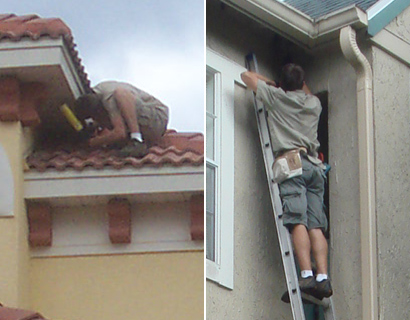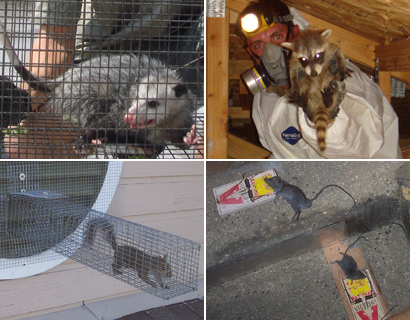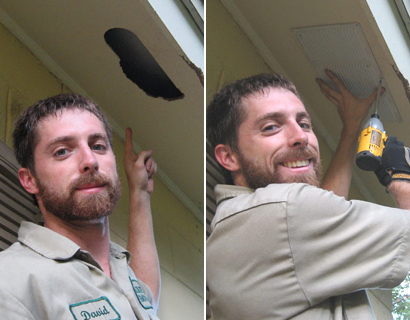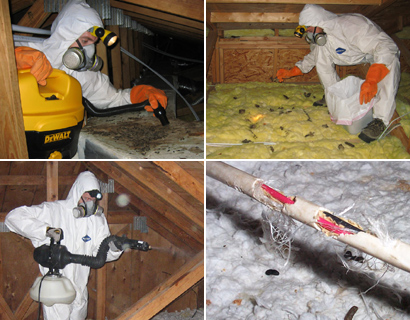- How We Solve Florida Wildlife Problems
How We Solve Boca Raton Wildlife Problems
INSPECTION: Once on site, we will perform a full inspection of your home and property. This allows us to use the correct strategy and traps. If the animals are in an attic, a full building inspection is crucial, including the following:
- All ground-level areas, such as piper or A/C line entry & exit areas, A/C chase bottoms, ground-level vents, etc.
- All mid-level areas, such as dryer vents, siding gaps, first floor eaves or dormers, etc.
- We inspect the entire roof, including all plumbing stacks, ridge caps, vents, and other potential gaps or holes.
- We also inspect inside your attic, to identify animals and damage they have caused.
- If the animals are outside, we notice many subtle clues that will assist us in a successful strategy.
TRAPPING, EXCLUSION, REMOVAL: Once we understand what animal species we are dealing with, and the problem, we use the most effective means of removing the animals. We use dozens of different types of traps.
- Trapping - If trapping the animal(s) in live cage traps, trap type, set, and location are crucial to success.
- Exclusion - Oftentimes, we are able to simply set one-way doors or other exclusion devices that allow the animals inside a building to safely exit, but never get back inside.
- Removal By Hand - Sometimes we actually remove animals by hand, or with special tools like snare poles.
- The Law - In all cases, we obey state and local laws regarding wildlife, but aim to take the most humane approach.
ENTRY HOLE REPAIRS: Repairs are a crucial step in the wildlife removal process. In many cases, such as bat or rodent control, the job cannot be performed without detailed repairs, and in all cases, sealing the entry holes shut ensures that no future wildlife will ever enter your home.
- 100% of the entry holes must be found, and sealed shut, or the job is not complete.
- Our repairs are professional contractor grade, look good, and when applicable we use steel, which rodents such as rats or squirrels are unable to chew through.
- We give a written guarantee on our repairs against any future animal entry.
ATTIC DECONTAMINATION SERVICES: It may be desirable to clean your attic after we've removed the animals. They can leave behind large amounts of droppings, urine, hair, oils, food, nesting material, and so on. These remnants can attract insects like cockroaches, and the scent left behind can encourage new animals to chew their way into your house. You might experience odor problems from the waste. It's possible that mold will grow on waste areas.
- We remove or vacuum all droppings, or remove all the soiled insulation.
- We fog the attic with a special enzyme-based cleaner that destroys any organic matter and deodorizes the space.
- We repair damage, such as ductwork, electrical wires, pipes, insulation, and more.
South Florida is known for it's exotic wildlife. Sometimes that wildlife likes to end up on your property or in your home. If you have found yourself at large with a nuisance issue give us a call! We are here to remove critters such as armadillos, squirrels, rats, bats, snakes, raccoon and more. Wildlife creatures can cause serious damage to your home if they go unnoticed. We service the following cities: Aventura, Belle Glade, Boca Del Mar, Brownsville, Coconut Creek, Cooper City, Coral Gables, Coral Terrace, Country Club, Country Walk, Cutler Bay, Dania Beach, Davie, Deerfield Beach, Delray Beach, Doral, Florida City, Fontainebleau, Gladeview, Glenvar Heights, Goulds, Greenacres, Hallandale Beach, Hamptons, Hialeah Gardens, Homestead, Ives Estates, Jupiter, Kendale Lakes, Kendall West, Kendall, Key Biscayne, Kings Point, Lake Worth Corridor, Lake Worth, Lauderdale Lakes, Lauderhill, Leisure City, Lighthouse Point, Margate, North Palm Beach, Oakland Park, Ojus, Olympia Heights, Opa-locka, Palm Beach Gardens, Palm Beach, Palm Springs, Palmetto Bay, Palmetto Estates, Parkland, Pinecrest, Pinewood, Plantation, Princeton, Richmond West, Riviera Beach, Royal Palm Beach, Sandalfoot Cove, Sunny Isles Beach, Sunrise, Sunset, Sweetwater, Tamarac, Tamiami, The Crossings, The Hammocks, University Park, Wellington, West Little River, West Park, Westchester, Weston, Westwood Lakes, Wilton Manors, Boynton Beach, Miami, and Delray Beach. We also service the following counties: Dade County, Broward County, Monroe County, Collier County, Hendry County, Lee County, Glades County, Charlotte County, Martin County, St. Lucie County, Okeechobee County, Hardee County, Manatee County, Sarasota County, and Indian River County.
Other Boca Raton animal pest control topics:
Do Squirrels Live in Urban Areas
What is raccoon roundworm
What Are a Snakes Mating Habits
How to Find and Remove a Dead Mouse
Are armadillos Dangerous to Cats, Dogs, or Other Pets?
Do Rabbit Repellents Work?
To learn more about our services, visit the Boca Raton wildlife control home page.
This month's wildlife how-to article: Where should I relocate a trapped snake?
Where should I relocate a trapped snake?
Is it humane?
So you've successfully trapped a snake. Now, you want to get it off your property, right? Some people choose an easier route than relocation and that's by killing the snake. Killing a snake sure does take less effort than driving a long way in order to get the snake off your property and hopefully it not having to return. However, is that the best solution? Relocating a snake can be like balancing a knife on an edge of precipice - one false move and you might inevitable destroyed the life of the creature you were hoping to save. How can this be, you might ask.
How far is too far?
If your sole purpose is to just get the snake as far from your property as possible, then maybe you are better off just killing it. Taking a snake from its natural habitat, is like giving it a death sentence. In order to survive, snakes need to know that they are an area that they find familiar but if you take them too far from their natural home, maybe relocation, in that sense is not so very humane after all.
Alternatives
You next option is sadly not a permanent solution. Yes, you will be relocating the snake but only a short distance away from your property giving it a chance to get back to its natural habitat where it can:
• Find food/prey
• Seek refuge
• Mate
This may be as close as 1000 feet. The snake maybe able to get back onto your property or your house even but that is very unlikely. So this step, although not permanent, is possibly the safest bet for the survival of the snake. For venomous snakes, it is best to call the experts. Never, ever approach a venomous snake! Let them handle the relocation of the creature. In fact, in some cases, relocation may not be an option for the snake. The professionals will then take them to somewhere the snake can be utilized for research or education purposes such as:
• Zoos
• Universities
• Laboratories
Conclusion
Snakes are part of our ecosystems. We must learn how to live with them instead of thinking of them as another nuisance. We have to respect them. In this manner, we have to take precautions because snakes are potentially still dangerous creatures. Educating yourself and your loved ones about co-existing with these creatures are highly important. Not only are you protecting yourselves but you are safeguarding the future of the snake population in your area.





